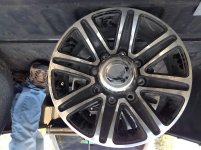porthole
Retired
I'm right there with ya!
Except you forgot one on your list . . . documentation and proof for each and every time one makes or has these checks made or done!
Good catch John. I left it out because one does not have to document or prove it. It would be incumbent on the manufacturer to prove that you did not perform the required maintenance.
Now that said, there is nothing wrong with keeping receipts and documenting your work.
Torquing wheel lug nuts really came to be more of an issue with the proliferation of alloy wheels. Plain steel wheels have a relatively thin area that is clamped between the hub and lug nut. Alloy wheels could be up to an inch or more at the hub. And some alloy wheels have steel embedded in them.
With trailers, I venture to guess that not only are the alloy wheel an issue, but the quality of the lug nuts and studs as well. Even the diameter of the hub surface can be an issue, and don't think for a minute that diameter has not decreased over the years.The lug nuts that come on the trailers are only an average quality item. Only takes a few seconds of a google search to find yourself higher quality lug nuts.
Now that said. I did over 20 years in the automotive field (that is my post HS degree) with a little over 18 years of that at high volume dealers. Not once that I can recall in the literally thousands of wheels, probably tens of thousands of lug nuts that I R&R'd, did I use a torque wrench. Multiply that by the 10's of thousands of similar operations being performed every year and - my point - wheels are not falling off all over the roadways.
Think about the time required to properly torque my F-350. 165 foot pounds final torque for 24 lug nuts, using 4 steps. 60-100-130-165 - that is 96 separate operations, not including if I oil the washers, which would be another 48 operations. If your think any mech or tech working on time in a shop is going to spend a 1/2 hour doing that - not happening. When seconds count, air is the way. Heck, NASCAR cars run under tremendous loads at speeds up to 200 mph and their air torqued wheels don't have have wheels fall off to often.
But, cars and trucks have different quality hubs, wheels, studs and lug nuts perhaps. They defiantly have wheel bearings that don't have to be cleaned and greased yearly or every 5000 miles.
The tools of choice were made by Ingersoll-Rand, Mac, Chicago pneumatic etc and used varying air pressures of 90-120 psi. Think of all the various lug nut tightening procedures out there between different tools, air pressures and "finger on the trigger times".
Personally, probably in the last 20 years I have used torque wrench hundreds of times more then I ever did. When I was in the automotive field I had a 3/8" drive dial inch pound, 3/8" drive click inch pound and a 1/2" drive click foot pound, with a torque multiplier (threw away the old "beam" type when I started earning a living). Since leaving the field I got rid of the multiplier, but added two more electronic TW's.
Only one of all the torque wrenches I have had was ever sent out to be re-calibrated. Since the cost of that was more then half of a new wrench I never had another wrench calibrated.
I now torque the lug nuts on my trailers, truck and car all the time (if they have been removed). I have never re-checked the cars or trucks, but have the trailers. And the trailers will only get checked once, couple hundred miles maybe.
The real key advantage with using the torque wrench is that you will be clamping all the lug nuts to a fairly equal torque load. Far more equal then air gunning it or just winging it with a lug wrench. A flat wheel on a flat hub with equal clamping pressure across the surface area has little chance of coming loose. One of the reasons for torquing correctly is that you are actually getting the "clamp" by stretching the stud a bit.
More important then if your torque wrench is accurate to within 1-2 foot pounds is that that you can get repeated accuracy within the range of the tool you are using. Example, your 120 ft lb wheels are better off having 6 lug nuts torqued to 115 foot pounds then 6 lug nuts torqued to 120-120-105-148-100-130.
Even the way you use a torque wrench has an outcome on the final torque. Smooth application, hands in the same position every time, wrench "square to the wheel"
If you so desire to buy your self a torque wrench spend the money and buy a good one, that means steer away form the the HF stuff. The Sears line of wrenches have pretty good reviews and the electronic version are rated real good.
If you have one broken stud or perhaps a stripped or seized lug/stud you may be OK for a while, but once the 2nd lug is a failure, wheels will be coming off on their own.
BTW, clean and dry threads for lug nuts and studs. No oil.
But if you have lug nuts with attached washers like on the Ford's, they get a very light oiling at the interface between the nut and the washer. Makes a mess on the wheels though initially.

